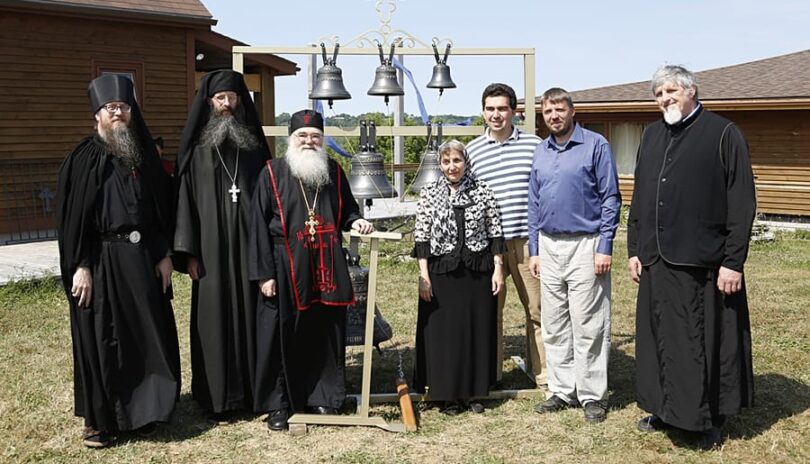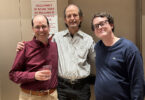The Russian Orthodox Church Outside of Russia is strong in its traditions of piety, liturgical exactness, and the self-sacrifice of its episcopate and clergy. However, in the practice of the “liturgy after the liturgy” – that is, support of the clergy and the needy, catechization, and academic projects – our Church continues for many years to fall behind other Orthodox Churches in North America. Thus, the humanitarian projects that do exist in the ROCOR are worth more of the faithful of our church knowing about and being inspired by, so that we begin to understand more clearly that the future of the Russian Church Abroad is in our hands.
Thus, on this warm October day, we are speaking with the handmaid of God Elizaveta, founder of the foundation “Russkaia Dusha” (Russian Soul), created in Canada in 2015 with the blessing of Metropolitan Hilarion, First Hierarch of the Russian Orthodox Church Outside Russia. ROCOR Studies is grateful to the foundation “Russkaia Dusha” for supporting posting on our website bios of the people burried on the Jordanville cemetery.
Why did you decide to create this foundation?
Before this, I was already trying to serve the Russian Orthodox Church, and I prayed that my path would be revealed to me. Living in the emigration, I understand that one’s spiritual life must be the most important thing. Everything else is secondary. Why a foundation? So that there would be an orderly process – if you are doing something, you have to make it official. The goals and tasks were to help those very people who had not yet come to Russian Orthodoxy.
Among the emigration?
Native Russians or Orthodox of other nationalities who had not come into the Church itself. All of us came into being by God, but have we gone to meet Him? He is always with us, but have we gone to find Him? This sort of missionary work is very near to my heart. I love to meet with people. People can also meet with me still. I decided to pour my experience into this foundation, experience as a teacher and a Christian.
What projects have you been able to support in the Russian Church Abroad?
The foundation put a lot of effort into the creation of a parish in Florida, which, unfortunately, did not work out. Our support of a monastery in Florida was more successful. As a result of successful cooperation with the Fund for Assistance of the ROCOR, we sent aid to Haiti, Puerto Rico, Pakistan. If Vladyka Hilarion will bless, then we will help establish bell ringing in that community of ROCOR. Our Orthodox churches abroad are mute – there are not, there have not been bells. To fulfill this project, we gave bells to the church of the Annunciation monastery in Nova Scotia (OCA) and to the St. George church in Florida (ROC). Then, along with the bells, a master bell-ringer goes, gives a class, teaches how to set up the bells. There was an idea, desire, and prayer to establish a female monastic community. I am really praying for this.
In Orthodoxy, you bear the name of the nun-martyr Elizabeth Feodorovna, and now we are meeting in Moscow – in the city where she served disenfranchised people. This must also be a part of what you want, that the nuns would care for…
This is my prayer and desire. We came, our generation from the 1960s. We came into the church. Did our children come? We will see. They can come to Liturgy with us, but are they immersed in the Liturgy? That can come with us on Sundays, stand with us, take communion…
As I understand it, the name “Russkaia Dusha” in no way excludes people of other ethnic backgrounds. You are also working with Bishop Irenee, the ruling bishop of the OCA in Canada, who served for many years in the Russian Church Abroad, and there you are supporting missionary efforts in Nova Scotia. I also heard that you are assisting an orphanage in Uganda.
Yes. There was a project. A Catholic church, an abbey. Six years ago they came to us for help establishing an orphanage for children who got HIV from their parents. In the beginning, there were 10 children, now there are already 75. We cannot… If anyone says that Orthodoxy is only Russian or Greek, then I cannot agree. Orthodoxy as a faith is universal, worldwide, and embraces all nationalities.
I had a unique encounter this year. Representatives of their foundation came to Russia for the hundredth anniversary of the murder of the royal family – from Washington, New York. They are building a bridge between the Catholic and Orthodox Churches. There were 12 of them. I don’t think this just happened by chance; I believe only in God’s providence. Women and men. We stood at the mineshaft where the royal new martyrs Grand Duchess Elizabeth and Nun Barbara were killed, with the other Romanov princes. If only you could see their reaction to the moleben served at the mineshaft! If it had been one or two minutes longer, they would all have become Russian Orthodox. They were so immersed. That impressed me, and showed me how a person from a different Christian confession can relate to Orthodoxy. “Elizaveta,” they said, “no one has ever talked to us about Russian Orthodoxy like you are telling us now.”
How interesting!
It’s because I’m not Russian by nationality – Vladyka Hilarion received me into Orthodoxy from the Armenian-Gregorian church. But like I’m telling you, they were so moved and now want to be friends with us and make pilgrimages, not only to go see the monastery, but they want to live in the monastery. The founder of the foundation even said to me, “Elizaveta, promise me in front of everyone that if something happens to me, you will not abandon my son, but you’ll help him continue this work.” This was after a forty-minute talk and nothing else. And the simplest monastery food, believe me. This was Alapaevsk, not Moscow. But they were moved. And I don’t want to stop there.
Elizaveta, I hope that the Lord gives you strength. Both to you and to your husband to bear this essential service, which is too rare, and which you are making happen. May God help you continue with wisdom, humility, and everything else necessary. I hope that everyone who reads this will pray for God’s help for you.
Conducted by Deacon Andrei Psarev











